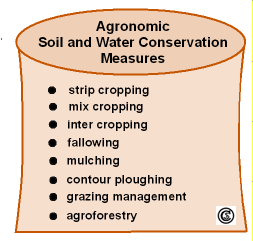Agronomic Soil and Water Conservation Measures
Selection of agronomic soil and water conservation measures applied in WM
Image Credit: after Krüger et al. 1997, Lal 1995, Tidemann 1996
Agronomic conservation measures function by
- reducing the impact of raindrops through interception and thus reducing soil erosion and
- increasing infiltration rates and thereby reducing surface runoff and soil erosion (Tidemann 1998).
Some possible agronomic measures are shown in the figure right. These measures can be applied together with physical or biological soil and water conservation measures. In some systems they may be more effective than structural measures (Heathcote 1998). Furthermore, it is the cheapest way of soil and water conservation (Wimmer 2002). The significance of land use practices becomes apparent in a comparison made by Tidemann 1996: "The differences in erosion rates caused by different land use practices on the same soil are much greater than the corresponding values from different soils under the same land use".
However, agronomic measures are often more difficult to implement compared with structural ones as they require a change in familiar practices (Heathcote 1998).
A widely used agronomic measure is contour ploughing which is described more precisely in the next step.
